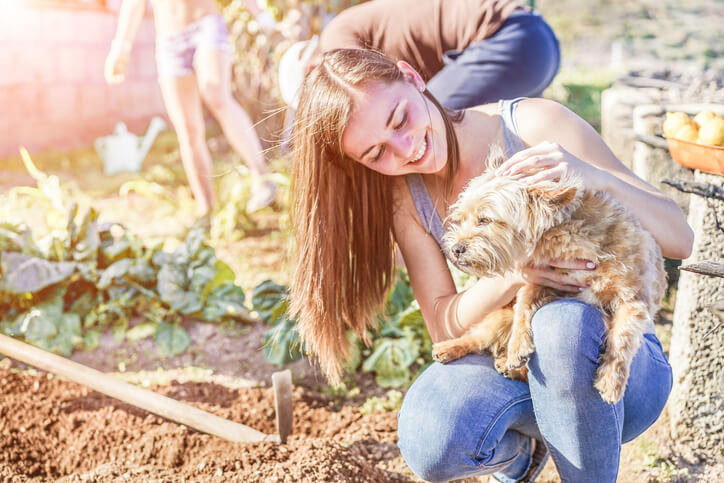We Love Our Pets, But They Don’t Belong In The Fruit & Vegetable Garden
7 years ago | Pets
By Joy Stephenson-Laws, JD, Founder
My husband Eric and I are the proud ‘parents’ of five German Shepherds. They can be a handful, but I wouldn’t have it any other way. Not only are dogs adorable and loving creatures, but owning a dog may also reduce our risk of having heart problems and stress related issues. In fact, there are many health benefits associated with owning dogs. To put it simply, dogs may help us live longer!
But as dog owners, we also have to be aware of the health hazards associated with pet ownership. For example, we never allow our dogs to run free in the areas where we plant fruits or vegetables. And if you grow fruits or vegetables at home, you should not let your dogs run free in those areas.
Some dog owners may think it’s safe and perfectly fine for dogs to ‘do their business’ anywhere as long as it’s outdoors. But pet waste can contaminate the produce your garden grows and make you more prone to foodborne illnesses. Certain pathogens in pet waste, like roundworms, may make people sick if they are ingested.
“No one in their right mind intentionally touches or ingests dog or cat poop, but people can nevertheless expose themselves to several nasty disease-causing agents from it via contaminated soil or water. These include salmonella, a bacteria that humans more commonly get from contaminated food, and giardia, a single-celled parasite that can cause severe diarrhea,” reports Harvard Health.
(E. coli is another bacteria often responsible for foodborne illnesses).
In fact, some pathogens can last in your yard for as long as four years if the waste is not cleaned up properly.
And a recent report states that waste from animals contaminating fresh produce is one of the major causes of foodborne illnesses. The National Institutes of Health (NIH) says that known foodborne disease agents are estimated to cause approximately 9.4 million illnesses each year in the United States.
It’s not just your home garden you have to watch out for.
We’ve previously discussed how to approach food safety at farmers’ markets, and pet waste contamination may be another precaution you need to take when purchasing fresh produce at these community fruit and vegetable stands that support local farmers.
"I have seen a dog pee on the corner of a farmers market table, and another place his head near the produce (where has that mouth been?)," according to food safety educator Diane Wright Hirsch.
(Although relatively rare, leptospirosis is a bacterial disease spread through the urine of an infected animal).
“Farmers are working hard to produce safe fruits and vegetables—why let someone's dog ruin it all with a lick, a squat or a lift of the leg?" Hirsch said.
Many farmers’ markets in the United States no longer allow dogs (with the exception of service animals) onsite, but there are still places and major cities, for example in Chicago, that host pet-friendly farmers’ markets.
“It’s an outdoor business,” said Sheree Moratto, director of Glenwood Sunday Market in Chicago’s Rogers Park, in this report from the Chicago Tribune...“so we’re coming at it from (that) point of view. … There are so many simple ways you can approach having a good relationship with customers and their pet if you’re flexible.”
I beg to differ. Outdoor businesses are good, but it is my opinion that farmers’ markets should also be concerned with ensuring that consumers not increase their risk of diseases from contaminated foods. Most people who attend farmers’ markets come to stock up on fresh foods, including nutrient-dense fruits and veggies, so that they can eat healthily and live their healthiest lives. And they should be able to do so without the risk of being exposed to foodborne illness due to animal waste contamination.
And according to the report about pet waste contamination mentioned earlier, “It's vital to keep animal and poultry feces out of residential and community gardens and well away from farmers markets and roadside food stands.”
And, of course, the best way to ensure this happens is to not allow animals in the fruit and vegetable garden or market.
How can you be proactive?
Well if you live in a place where dogs and pets are allowed at farmers’ markets and you usually bring your pet when you visit the market, I hope this blog makes you reconsider. It’s tempting to bring our pets everywhere we go when possible, but sometimes we really have to ask ourselves if it is worth it. And in this case, I don’t think it is especially since you could be putting others at risk of getting sick.
Remember to wash your produce thoroughly after bringing it home and before preparing meals with it. I would highly recommend using an organic vegetable wash spray, and wash your hands before handling your fresh produce. Use separate cutting boards for your meats and produce, and check out this older pH Labs blog about kitchen towel safety.
Finally, if you have a fruit and vegetable garden at home, ensure that it is segregated and inaccessible to the dogs.
Enjoy your healthy life!
The pH professional health care team includes recognized experts from a variety of health care and related disciplines, including physicians, attorneys, nutritionists, nurses and certified fitness instructors. This team also includes the members of the pH Medical Advisory Board, which constantly monitors all pH programs, products and services. To learn more about the pH Medical Advisory Board, click here.







